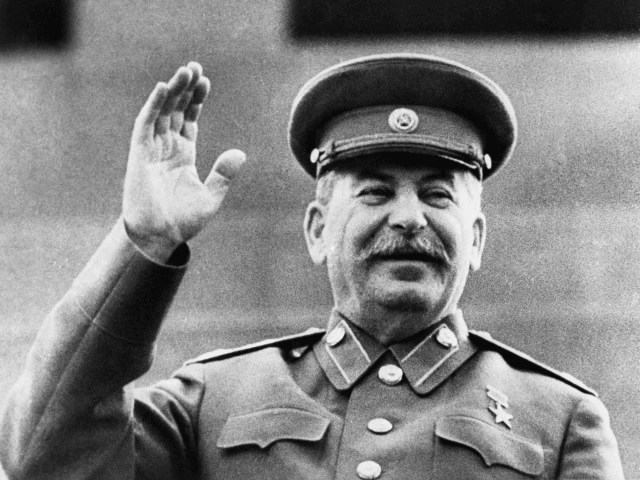In anticipation of May Day, the international communist holiday, the New York Times published an opinion piece celebrating the American communists of the twentieth century, arguing that communism – an ideology that has killed 100 million people – gave Americans a “sense of one’s own humanity.”
The column, titled, “When Communism Inspired Americans,” lionizes communism as a religion with a “founding myth” that helped the “educated middle class” feel relevant in national politics. The author, Vivian Gornick, quotes her mother expressing gratitude for communists and crediting them with America’s thriving republic.
Save for a passing reference to the Soviet Union, however, the article fails to mention how communism ravaged the democratic order of every country it touched, leaving a trail of millions of bodies in its wake. The article also fails to mention the New York Times‘ role in helping promote communism globally, from publishing lies about Soviet genocide to fabricating news stories about Fidel Castro.
Gornick writes that she grew up in a “progressive” household where communists “spoke and thought within a context that lifted them out of the nameless, faceless obscurity into which they had been born, and gave them the conviction that they had rights as well as obligations.”
“They were not simply the disinherited of the earth, they were proletarians with a founding myth of their own (the Russian Revolution) and a civilizing worldview (Marxism),” she remarks wistfully, praising the Communist Party’s “moral authority.” She notes that, for these individuals, accepting the realities of Stalinism proved difficult.
“It was this all-in-allness of world and self that, all too often, made of the Communists true believers who could not face up to the police state corruption at the heart of their faith, even when a 3-year-old could see that it was eating itself alive,” she laments, describing their reactions to the admissions from Soviet leaders following the death of Stalin.
While mentioning Joseph Stalin in passing, Gornick’s piece addresses communism as an isolated fad within white, middle-class America, with no mention of the communities of color around the world ravaged by communist agitators influenced by, among others, the New York Times. The outlines of the tragedy of communism are well-known: nearly 100 million deaths (and counting); war and famine spanning the planet, from Angola to Cuba to North Korea; families torn apart for generations; and untold environmental damage, particularly a product of Chinese communist industrial policy and the flagrant disregard of the Soviets in running facilities like the Chernobyl nuclear plant.
What the New York Times readers may not be so acquainted with, however, is the role that newspaper played in putting a smile on the deadliest ideology in modern history.
For its coverage of the Soviet Union, which repeatedly denied the many atrocities committed under Stalin, the Times won itself a Pulitzer. Moscow correspondent Walter Duranty made a career of using the newspaper’s reputation to cover up Stalin’s crimes, from writing that “there is no famine or actual starvation nor is there likely to be” in Ukraine, where millions died, to, upon being no longer able to deny the mass starvation and murder in the country, dismissing it: “You can’t make an omelet without breaking eggs.”
Duranty’s coverage of the Soviet Union was so disingenuous that the New York Times hired a history professor to evaluate his work in 2003. Columbia University Professor Mark von Hagen told the newspaper he believed Duranty’s Pulitzer should be revoked because of how dishonest his articles were.
While Duranty’s greatest lies were published in the 1930s, his style of fabrication continued well into the 1960s when writer Herbert Matthews leveraged his newspaper’s influence to promote the Cuban Revolution. Writing in the Times, Matthews claimed that dictator Fidel Castro, then still a reviled upper-middle-class lawyer who had fled to the mountains to avoid actual conflict with the government, was blessed with a formidable army of rebels by his side and that the Cuban government was in a “losing battle” with him. Castro later wrote that he had lied to Matthews, claiming to have hundreds but only counting on twenty foot soldiers at the time and making them parade in front of Matthews in a circle. In Castro’s telling, Matthews was too dense to have noticed that the men were walking in circles.
The Times regaled Castro – who sent thousands, including Christians, LGBT Cubans, writers, and dissidents generally, to labor camps and killed thousands of others using firing squads – as a “victorious guerrilla commander in 1959” and lauded the alleged “medical advances” and “racial equality” of communist Cuba in November when the Cuban government claimed Castro had finally died. The newspaper has a financial stake in ensuring that Americans, particularly the wealthy ones who still subscribe to the New York Times, remain ignorant of the true repressive state Castro created in Cuba: it sells Cuban “people-to-people” tours, accompanied by Times reporters, for nearly $7,000 a pop.
The Times published a morally ambiguous obituary for another communist tyrant decades ago: Kim Il-sung, the founder of the oppressive prison state commonly known as North Korea. The Times called the Democratic People’s Republic of Korea (DPRK) a “family business” for Kim in his obituary, blaming the decline of North Korea on its becoming “diplomatically isolated” (despite support from China and the USSR) and its neighbors developing stronger ties with South Korea.
The New York Times recently launched an ad campaign titled “The Truth,” in which it promises consumers unbiased and trustworthy journalism.

COMMENTS
Please let us know if you're having issues with commenting.